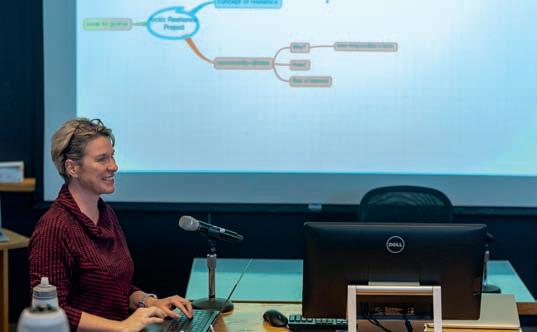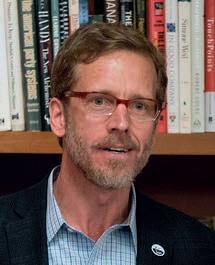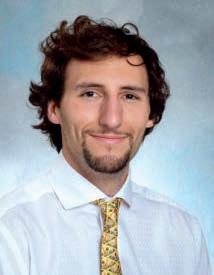
7 minute read
Fellows, Affiliates, and Associates
Meet Jennifer Spence, New Senior Fellow
Jennifer Spence led an interactive mind-mapping exercise at the Arctic Initiative’s “Advancing Arctic Resilience” workshop on March 30, 2022.
Jennifer Spence, one of Canada’s leading Arctic experts, has joined the Arctic Initiative as a full-time resident Senior Fellow for the 2022–2023 academic year. Spence will substantially enhance the Initiative’s capacity to address the future of Arctic governance—a critical issue in the wake of Russia’s invasion of Ukraine. Spence has been working with the Initiative as a non-resident Affiliate since 2021, while serving as Executive Secretary of the Sustainable Development Working Group of the Arctic Council and Adjunct Professor with Carleton University’s Northern Studies Graduate Program. Prior to her work at the Arctic Council and CU, she spent eighteen years working for the Canadian government in senior positions related to resource, conflict, and change management; strategic planning; and leadership development. Spence’s expertise in sustainable development, international governance, institutional effectiveness, and public policy is complemented by a particular passion for working with Northerners to understand and respond to the opportunities and challenges facing the Arctic region. At the Belfer Center, she will help lead the Initiative’s ongoing work on building Arctic communities’ resilience to rapid socio-ecological changes, as well as related governance issues. We sat down with Dr. Spence to talk about her career and her plans for the coming academic year.
Your career has taken you all over the world, including a stint as a safari lodge manager in South Africa. What sparked your interest in the Arctic?
While my life path may seem a little circuitous, there are a couple common threads—building strong relationships, empowering local peoples to take policy action that meets their needs and interests, and trying to recognize the interconnections between policy issues and advancing change. All these things brought me to the Arctic—a unique, innovative governance space where Indigenous peoples are leading the way on a wide range of big policy challenges. It’s a region that really demonstrates that how policy is developed is as important (and sometimes more important) than what the policy solution is.
You have a degree in conflict management and nearly two decades of experience working on related issues for the Canadian government. How can we keep cooperation in the Arctic moving forward during a time of geopolitical crisis?
Unfortunately, recent events have demonstrated that Arctic cooperation is not immune from global geopolitics. But there is no shortage of important work to do in the Arctic. Conflict brings challenges, but it can also be an opportunity to see beyond the status quo and find new, innovative solutions. What we need to focus on now is supporting the peoples of the Arctic as they lead efforts to advance their priorities, whether that be locally, nationally or internationally. Cooperation in the region may need to change, but it should not stop.
What led you to join the Arctic Initiative as a Senior Fellow?
Over the last 25 years, I have worked on public policy in government, in academia, and in close collaboration with Arctic Indigenous peoples, who have the critical knowledge and experience to find policy solutions to the challenges facing the Arctic and the globe. However, the links between these three worlds can be weak. I am happiest as a “translator”—that is, when I have an opportunity to bridge the gaps between these worlds. I think this makes for better policy. The Arctic Initiative is committed to this bridging function and is focused on
critical policy issues that I am incredibly passionate about. I can think of no better team with which to continue this important work.
What will you be focusing your research on in the coming year?
I have specific work planned in four areas: 1) a collaborative project with Indigenous communities, NGOs, and research institutions to develop community-relevant indicators and tools that accelerate social-ecological resilience in the North American Arctic in the face of rapid climate change; 2) contributing to the Permafrost Pathways project; 3) a special journal issue dedicated to understanding the unique experiences and conditions of COVID-19 in the Arctic; and 4) the future of Arctic governance—a topic that is near and dear to my heart.
Share an interesting story or experience you have had while working in the Arctic.
It’s tough to pick one. For me, it’s about the people. From Dawson to Iqaluit, Akureyri to Umea, Tromsø to Salekhard, I’ve heard amazing stories from, shared spectacular food with, and seen the passion and dedication of so many people that live in and care deeply about this region. I am honored to call many of them dear colleagues and friends. That said, I recently had the pleasure of racing reindeer with [Initiative Senior Fellow] Joel Clement near Kautikeino, Norway. I won’t mention who won. Douglas Causey is an Arctic Initiative Associate, Professor of Biological Sciences at the University of Alaska Anchorage (UAA), and Principal Investigator of the U.S. Department of Homeland Security Arctic Domain Awareness Center of Excellence. He previously served as a Belfer Center Senior Fellow and a Senior Biologist at the Harvard Museum of Comparative Zoology. An ecologist and evolutionary biologist by training, he has authored over 200 publications on the environmental correlates of Arctic climate change.
Joel Clement is an Arctic Initiative Senior Fellow and a science and policy consultant with a background in resilience and climate adaptation, landscape-scale conservation and management, and Arctic social-ecological systems. As Director of the U.S. Interior Department’s Policy Office, he led a team of policy analysts and economists, provided advice and analysis to White House leadership and two Secretaries of Interior, and developed innovative policies to address landscape conservation needs.
N. Stuart Harris, M.D., is an Arctic Initiative Faculty Affiliate, founder and Chief of the MGH Division of Wilderness Medicine, and the Director of the MGH Wilderness Medicine Fellowship. He works as a full-time attending physician in the MGH Emergency Department and an Associate Professor of Medicine at Harvard Medical School. Working with colleagues in Kotzebue, Alaska, he helped found Siamit to learn from and contribute expertise to community care in remote Alaska Native communities.

Editor’s Note: Jen totally won.


Halla Hrund Logadóttir is an Associate and Co-Founder of the Arctic Initiative and the Director-General of Iceland’s National Energy Authority. She teaches “Policy and Social Innovation for the Changing Arctic” at Harvard Kennedy School and co-curates the World Economic Forum’s Arctic Transformation Map. In her native Iceland, she serves on the advisory board to Iceland’s Minister of Industry and Commerce on Iceland’s Energy Fund and chairs the Arctic Innovation Lab.
Cristine Russell is a Senior Fellow at the Belfer Center’s Environment and Natural Resources Program and a former Adjunct Lecturer in Public Policy at HKS. She is an award-winning freelance journalist with four decades of experience covering environment, public health, and STEM issues for news media outlets such as The Washington Post, Scientific American, and The Atlantic. She previously served as President of the Council for the Advancement of Science Writing and the National Association of Science Writers.
Fran Ulmer is an Arctic Initiative Senior Fellow and the Chair of The Nature Conservancy’s Global Board of Directors. She was appointed by President Obama as the chair of the U.S. Arctic Research Commission from 2011–2020 and served on the National Commission on the bp Deepwater Horizon Oil Spill. From 2007–2011, she was Chancellor of the University of Alaska Anchorage (UAA). She served as an elected official for 18 years as the mayor of Juneau, a state representative and as Lieutenant Governor of Alaska. Lorenzo Albala, M.D., is an Emergency Medicine Physician at MGH. Raised in a rural mountain town in Northwest Italy, he completed a Master’s degree in Biomedical Engineering before continuing on to Harvard Affiliated Emergency Medicine Residency. He has worked as an instructor for medical student courses and has developed novel resident physician wilderness medicine curricula. His current work leverages digital media to foster safety and respect for austere environments.

Luke Apisa, M.D., is a Fellow at the MGH Division of Wilderness Medicine. He works closely with the Alaska Native Tribal Health Consortium to provide medical care to the Inupiaq people of northern Alaska, where he is leading quality initiatives to improve outcomes in critically ill patients at Maniilaq Medical Center. His current research initiatives include modeling of COVID transmission in rural Alaskan communities and the human health effects of permafrost thaw.
Nadezhda Filimonova is an Arctic Initiative Research Fellow, a PhD candidate at the University of Massachusetts Boston, and an affiliated scholar at the Institute for Advanced Sustainability Studies. She holds Master’s degrees in Political Science and International Relations from Uppsala University and St. Petersburg State University. The recipient of numerous fellowships and awards, she has also authored several peer-reviewed publications. Her research explores urban climate change governance in the Arctic.















